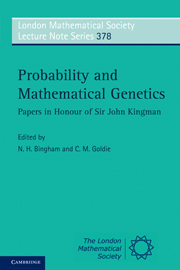Book contents
- Frontmatter
- Contents
- List of contributors
- Preface
- Bibliography of J. F. C. Kingman
- 1 A fragment of autobiography, 1957–1967
- 2 More uses of exchangeability: representations of complex random structures
- 3 Perfect simulation using dominated coupling from the past with application to area-interaction point processes and wavelet thresholding
- 4 Assessing molecular variability in cancer genomes
- 5 Branching out
- 6 Kingman, category and combinatorics
- 7 Long-range dependence in a Cox process directed by an alternating renewal process
- 8 Kernel methods and minimum contrast estimators for empirical deconvolution
- 9 The coalescent and its descendants
- 10 Kingman and mathematical population genetics
- 11 Characterizations of exchangeable partitions and random discrete distributions by deletion properties
- 12 Applying coupon-collecting theory to computer-aided assessments
- 13 Colouring and breaking sticks: random distributions and heterogeneous clustering
- 14 The associated random walk and martingales in random walks with stationary increments
- 15 Diffusion processes and coalescent trees
- 16 Three problems for the clairvoyant demon
- 17 Homogenization for advection-diffusion in a perforated domain
- 18 Heavy traffic on a controlled motorway
- 19 Coupling time distribution asymptotics for some couplings of the Lévy stochastic area
- 20 Queueing with neighbours
- 21 Optimal information feed
- 22 A dynamical-system picture of a simple branching-process phase transition
- Index
8 - Kernel methods and minimum contrast estimators for empirical deconvolution
Published online by Cambridge University Press: 07 September 2011
- Frontmatter
- Contents
- List of contributors
- Preface
- Bibliography of J. F. C. Kingman
- 1 A fragment of autobiography, 1957–1967
- 2 More uses of exchangeability: representations of complex random structures
- 3 Perfect simulation using dominated coupling from the past with application to area-interaction point processes and wavelet thresholding
- 4 Assessing molecular variability in cancer genomes
- 5 Branching out
- 6 Kingman, category and combinatorics
- 7 Long-range dependence in a Cox process directed by an alternating renewal process
- 8 Kernel methods and minimum contrast estimators for empirical deconvolution
- 9 The coalescent and its descendants
- 10 Kingman and mathematical population genetics
- 11 Characterizations of exchangeable partitions and random discrete distributions by deletion properties
- 12 Applying coupon-collecting theory to computer-aided assessments
- 13 Colouring and breaking sticks: random distributions and heterogeneous clustering
- 14 The associated random walk and martingales in random walks with stationary increments
- 15 Diffusion processes and coalescent trees
- 16 Three problems for the clairvoyant demon
- 17 Homogenization for advection-diffusion in a perforated domain
- 18 Heavy traffic on a controlled motorway
- 19 Coupling time distribution asymptotics for some couplings of the Lévy stochastic area
- 20 Queueing with neighbours
- 21 Optimal information feed
- 22 A dynamical-system picture of a simple branching-process phase transition
- Index
Summary
Abstract
We survey classical kernel methods for providing nonparametric solutions to problems involving measurement error. In particular we outline kernel-based methodology in this setting, and discuss its basic properties. Then we point to close connections that exist between kernel methods and much newer approaches based on minimum contrast techniques. The connections are through use of the sinc kernel for kernel-based inference. This ‘infinite order’ kernel is not often used explicitly for kernel-based deconvolution, although it has received attention in more conventional problems where measurement error is not an issue. We show that in a comparison between kernel methods for density deconvolution, and their counterparts based on minimum contrast, the two approaches give identical results on a grid which becomes increasingly fine as the bandwidth decreases. In consequence, the main numerical differences between these two techniques are arguably the result of different approaches to choosing smoothing prameters.
Keywords bandwidth, inverse problems, kernel estimators, local linear methods, local polynomial methods, minimum contrast methods, non-parametric curve estimation, nonparametric density estimation, non-parametric regression, penalised contrast methods, rate of convergence, sinc kernel, statistical smoothing
AMS subject classification (MSC2010) 62G08, 62G051
Introduction
Summary
Our aim in this paper is to give a brief survey of kernel methods for solving problems involving measurement error, for example problems involving density deconvolution or regression with errors in variables, and to relate these ‘classical’ methods (they are now about twenty years old) to new approaches based on minimum contrast methods.
- Type
- Chapter
- Information
- Probability and Mathematical GeneticsPapers in Honour of Sir John Kingman, pp. 185 - 203Publisher: Cambridge University PressPrint publication year: 2010
- 1
- Cited by

